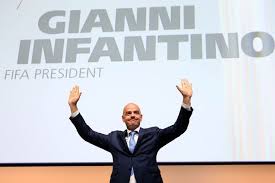By Andrew Warshaw and Samindra Kunti
February 27 – The international match calendar, which has divided stakeholders throughout the game – all with vested interests – is to undergo its biggest ever review by FIFA.
Fixture congestion continues to be a major talking point, especially among club managers, and FIFA is now launching ‘The Vision 2020-2023: Making Football Truly Global’ to try and sort out the issue (along with a number of others) once and for all.
The strategic document is an overview of a prioritised list of ‘11 goals’, most of which FIFA president Gianni Infantino outlined when he came to power four years ago. They include reform of the transfer system and expanding the use of technology.
“The international match calendar plays a central role in the sustainable growth of football in all regions of the world and at all levels,” FIFA said in the new document.
“For this reason, the current system should, once and for all, be discussed thoroughly with all stakeholders and reviewed according to their needs in a collective effort to guarantee a truly global approach.”
So far that discussion has proved highly contentious within a FIFA world that is seeing a growing groundswell of discontent over Infantino’s policies and leadership.
In 2021, China will stage FIFA’s expanded 24-team format, but the revamped tournament has caused political division in football ranks with UEFA at unease over FIFA’s expansionist policies. In South America, CONMEBOL has felt alienated after Zurich decided to switch the venue of the next FIFA Council meeting to their Swiss headquarters. In Africa, FIFA’s intervention by sending general-secretary Fatma Samoura as delegate to CAF to clean up the regional game has sparked animosity, aggravated after Infantino suggested the continent’s flagship tournament, the Africa Cup of Nations, should simply be played once every four years. Asia has remained steadfastly watchful and suspicious of Infantino’s agenda.
Nevertheless, the ambition is clear, as is Infantino’s unrelenting quest for more power, influence and money. “This document lays out a plan to further modernise the football world, make it increasingly inclusive and pave the way to a landscape in which, one day, we will have at least 50 national teams and 50 clubs from all continents at a top competitive level,” said Infantino in a media release, alluding to FIFA’s troubled quest to gain a more dominant foothold in the cash-rich markets of the international club game where the governing body has generally been an unwanted and disruptive meddler.
FIFA is increasing the number of teams at the World Cup to 48 from 2026 which it hopes will bridge the gap between the haves and have-nots and ultimately bring at least 50 sides to that “top competitive level.” It is a nice ambition but does not have the feel of practicality, and FIFA does not have the money resource or capability to make it a reality on its own – it needs confederations and national associations for that.
The ‘vision’ document is not without unbridled ambition in the current sensitive and politically divided landscape. Infantino maintains his ambition to achieve a wider role for FIFA in the game saying: “The Vision 2020-2023: Making Football Truly Global is a blueprint for FIFA to pursue the objective of making football truly global while navigating a fast-changing world.”
The document also addresses hot issues like the use of new technology. “The successful implementation of VAR in FIFA’s competitions provides a foundation for the continuous enhancement of VAR technology, which should focus particularly on improving communication around VAR incidents and making the technology accessible for all member associations, regardless of their size and/or financial resources,” said FIFA.
In 2023, Infantino will stand for re-election when the Congress will, among other things, assess how much of his vision will have materialised.
The 11 points in Infantino’s vision, coming at a time when his popularity is at its lowest amongst those who elected him, could almost read like a re-election manifesto. A promise of what he is going to do (again). The vision points are:
- Modernise the football regulatory framework
- Grow revenues sustainably for further reinvestment in football
- Increase the efficiency and efficacy of the organisation
- Ensure the success of our iconic competitions
- Globalise our competitions
- Increase global competitiveness
- Maximise our impact on global football development
- Accelerate the growth of women’s football
- Harness technology in football
- Protect positive values in football
- Impact society through the power of football
Click here for The Vision 2020-2023: Making Football Truly Global
Contact the writers of this story at moc.l1734803228labto1734803228ofdlr1734803228owedi1734803228sni@w1734803228ahsra1734803228w.wer1734803228dna1734803228 and samindra.kunti at moc.l1734803228labto1734803228ofdlr1734803228owedi1734803228sni@t1734803228catno1734803228c1734803228

